The Essential Role of Exotic Pet Specialists
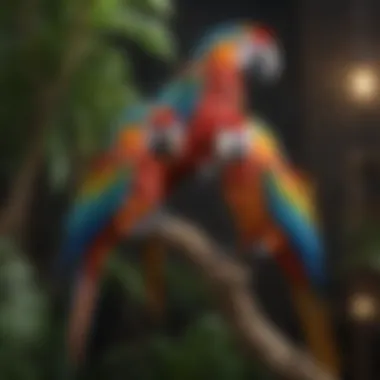
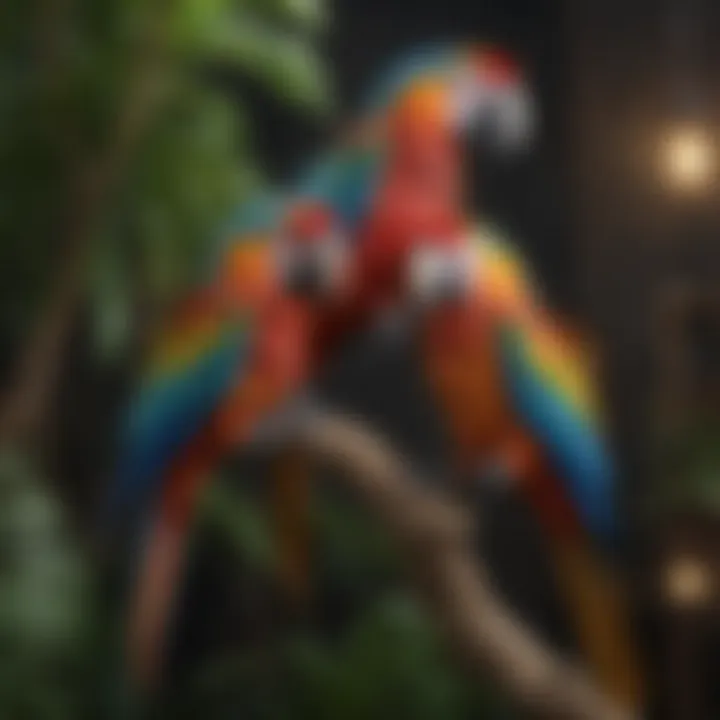
Intro
This piece brings to light the specialized world of exotic pet specialists, focusing on their vital role when it comes to ensuring the welfare of unconventional pet species. As the fascination with exotic pets grows, a deeper understanding of what these specialists do becomes paramount. Exotic pets, such as birds, reptiles, and small mammals, require unique care and handleing that differ significantly from more common companions like cats and dogs. Without the expertise of professionals who are educated on the nuances of these species, the health and happiness of these animals can easily be compromised.
In this article, we will venture through various aspects related to avian care, honing in specifically on birds—one of the most popular categories of exotic pets. From basic care to emotional well-being, we will illuminate the multiple layers of expertise that an effective exotic pet specialist must possess. Let's not dilly-dally; understanding these elements is critical for both pet owners and the specialists guiding them.
Avian Care Basics
Importance of Proper Nutrition
A well-balanced diet is crucial for the health of pet birds. These creatures have diverse dietary needs based on their species, age, and health requirements. It's not just about tossing some seeds into a bowl and calling it a day; sunflower seeds, for instance, are high in fat and not sufficient as a sole diet. Many birds thrive on fresh fruits and vegetables, as well as specially formulated pellets.
Proper nutrition prevents common health issues and contributes to a happy, active bird.
Understanding Bird Species and Their Needs
Not all birds are created equal. Parakeets, cockatiels, and African grey parrots each have their specific needs across different spectrums—temperament, social behavior, and environmental requirements. An exotic pet specialist should be well-versed in the characteristics of these species to offer tailored guidance to new or seasoned bird owners alike. Knowing each bird's quirks helps in choosing suitable companions and understanding their behavior better.
Basics of Birds Habitat Setup
Creating a suitable habitat is not simply about having a cage. A good bird habitat incorporates aspects like perches, toys, and an area for flying or exercise. It's important for birds to feel secure and have space to move. The layout should allow them to express natural behaviors, like climbing, chewing, and flapping. Proper habitat setup often prevents behavioral issues later on.
Grooming and Hygiene Tips
Regular grooming is critical—the feathers of a bird can collect dirt and debris that might hinder their natural oil distribution. Bathing opportunities, whether through misting or shallow pools, help keep feathers in top shape. Nail trimming and beak care are also important in preventing discomfort for the bird.
Interacting with Your Pet Bird
Building Trust and Connection
Establishing trust takes time and patience. Birds are sensitive creatures, and building a relationship with consistent handling and gentle communication can nurture bond. Encouraging exploration within their environment also becomes vital for building their confidence.
Training Techniques and Tips
Training doesn't just involve teaching tricks; it's about creating a mutual respect. Using positive reinforcement methods—like treats, praise, and affection—will yield the best results. Simple commands can enhance communication and understanding between human and bird.
Fun Activities for Bird Owners and Their Birds
Engaging in interactive play helps stimulate a bird’s mind. Toys, like puzzles or foraging activities, can easily make them more active. Owners could also write down a list of ideas for bonding time—like outdoor exploration in a safe environment or organized playtime in a room free of distractions.
Recognizing Bird Cues and Behaviors
Birds communicate through body language. Understanding when your bird feels upset or comfortable is key. A relaxed bird will have a more erect posture, while a puffed-up bird might feel threatened. Recognizing these cues helps in maintaining a peaceful environment.
Emotional Well-Being of Birds
The Role of Play and Socialization
Play is fundamentally crucial for emotional health. Birds are inherently social animals; engaging them in group activities or with other birds can significantly enhance their happiness. Specialists recommend structured interactions to facilitate this.
Enhancing Birds' Emotional Health
Ensuring emotional well-being requires effort. Enriching their environment, rotating toys, and offering companionship are steps every owner should consider. Birds thrive in environments where they stimulate their minds and bodies.
Assessing Bird Stress and Remedies
Birds can show signs of stress through behaviors like excessive screaming or feather-plucking. Identifying triggers—be it environmental disturbances or dietary issues—can help isolate problems. Working with a specialist often brings a clear perspective on the holistic treatment options available.
Building Strong Human-Bird Bonds
Strong bonds lead to happier, less stressed birds. Regular interaction, gentle petting, and a predictable routine can encourage trust and security. Birds are likely to learn and remember their owners' voices and habits, creating a unique relationship.
Bird Health and Safety
Common Health Issues and Prevention
Birds can suffer from numerous health issues such as psittacosis, feather cysts, or obesity. Regular health check-ups and a keen eye for symptoms can lead to early diagnosis. Additionally, maintaining a clean habitat aids in preventing various ailments.
Routine Veterinary Care
Taking birds to an avian vet should be a standard practice. Specialists can provide a checklist of vaccinations and regular health assessments, often pointing out slight changes in behavior that might signal larger problems.
Environmental Hazards to Avoid
Birds can be sensitive to toxic substances in the environment. Common household items like certain plants or non-stick cookware can pose threats. Being informed about these hazards can keep excitement for bird ownership from turning into distress.
Signs of Illness or Distress


Quick emergency responses are crucial. Symptoms such as a lack of appetite, lethargy, or unusual droppings should prompt an immediate vet visit. The sooner issues are addressed, the better the chances of recovery.
Fun Facts and Quirky Insights
Unique Traits of Popular Bird Species
Not just pets, some species—like the charismatic Cockatoo—are known for their intelligence and ability to mimic human speech. It helps to learn unique traits that not only make them stand out but also educate owners on the kinds of care they'll require.
Historical and Cultural Significance of Birds
Birds have played roles in various cultures. For instance, the Ancient Egyptians revered birds, considering them messengers of the divine. Understanding cultural perceptions adds depth to our connection with these animals as companions.
Famous Bird Owners and Their Stories
Many notable figures have been passionate about birds. Ludwig van Beethoven, for instance, had a remarkable affection for them. Such stories often inspire pet owners, drawing connections through shared interests and understandings.
With each section of our exploration of avian care, it's clear that the role of an exotic pet specialist is foundational not only for the animals but for their owners as well. With this knowledge, it becomes evident that a partnership with a specialist is invaluable in navigating the journey of exotic pet ownership.
Defining Exotic Pets
Exotic pets have become increasingly popular, attracting the attention of animal lovers across the globe. The notion of what constitutes an exotic pet can differ significantly among individuals. This subject is crucial not only for potential pet owners but also for the experts who cater to their needs. Defining exotic pets impacts how these creatures are perceived, cared for, and managed in various environments. It lays the groundwork for understanding their requirements, contributions, and how they differ from traditional pets.
The world of exotic pets encompasses a wide range of species, many of which have unique needs that standard domesticated animals do not. This makes having an exotic pet either a rewarding or challenging encounter. Therefore, knowing the specifics can guide potential owners in making informed decisions that ensure both their well-being and the animal's health.
Classification of Exotic Animals
Exotic animals can be classified in numerous ways, and one common approach is through biological taxonomy. In simple terms, animals like reptiles, amphibians, and various avian species often fall under this category. The defining factor is not necessarily whether the animal is common or rare; instead, it often hinges on its dietary, environmental, and behavioral needs which diverge significantly from well-known pets like cats and dogs.
- Reptiles: This category includes snakes, lizards, turtles, and tortoises. They often require specific temperatures, humidity levels, and specialized diets, such as insects or leafy greens.
- Birds: Parrots, canaries, and finches are popular in this group. These creatures can have varied social needs and complex behaviors, making proper understanding vital for owners.
- Small Mammals: This includes ferrets, hedgehogs, and sugar gliders. They often need specialized housing, as well as unique interaction styles with their owners.
- Aquatic Species: Here, one finds exotic fish, such as Betta or Lionfish. Water quality and tank setup become significant factors in their care.
Understanding these classifications helps pet specialists and owners recognize the requirements of each species and how best to address them, ultimately aiding the survival of these diverse creatures in captivity.
Common Species in Exotic Pet Ownership
When considering which exotic pets often find their way into households, a few names certainly rise to the top of the list. Each species possesses its own set of traits and care demands, making it essential for potential owners to understand them.
- Macaws: These vibrant, intelligent birds are known for their striking colors and engaging personalities. However, their need for mental stimulation and social interaction is a key factor in determining whether they're an appropriate choice for a potential owner.
- Ball Pythons: Often considered beginner-friendly, these snakes are generally mild-mannered. They don't require complex habitats, yet, understanding their specific dietary needs is necessary to keep them healthy.
- African Grey Parrots: Known for their exceptional vocal abilities and intelligence, African Greys require serious commitments in terms of time and interaction to thrive emotionally as well as physically.
- Sugar Gliders: These small marsupials are becoming increasingly popular due to their playful nature and unique appearance. However, they require social interaction, specialized diets, and appropriate habitats to lead happy lives.
By acknowledging the common species found in households and recognizing their specific care requirements, potential exotic pet owners can make better choices. Educating themselves about these animals promotes a healthier and more sustainable pet ownership experience—one that ideally benefits both the pets and their caregivers.
The Role of an Exotic Pet Specialist
The field of exotic pet care is a specialized arena that requires profound knowledge and experience. As the world embraces the uniqueness of various species, from birds to reptiles, the role of an exotic pet specialist has become increasingly vital. These professionals serve as the bridge between pet owners and the more obscure types of pet care. They not only ensure the health of these non-traditional pets but also educate owners about the best practices for keeping these creatures safe and thriving.
In an era where misinformation spreads as quickly as wildfire, a specialist's role includes debunking myths and providing accurate information. Every species, whether it's a parakeet or a python, has specific needs that differ significantly from more common pets. By understanding these needs, specialists play a crucial role in advocating for responsible ownership and animal welfare. The focus here is not just on individual care, but on fostering a broader understanding of exotic pets within communities, encouraging prospective pet owners to think carefully and seek guidance.
Core Responsibilities
The responsibilities of an exotic pet specialist extend far and wide, touching nearly every aspect of exotic pet ownership. Some of the core duties include:
- Consultation Services: Specialists guide potential and current owners through the complexities of their exotic pets. Each consultation is a chance to tailor advice based on specific animal needs, ensuring that owners know what they’re getting into before adopting.
- Health Assessments: Routine health evaluations are fundamental. These specialists are trained to recognize symptoms of illness that may not be evident at first glance. By conducting examinations, they can prevent serious health issues down the line.
- Educating Pet Owners: This is a big piece of the puzzle. Specialists hold workshops or private sessions to educate owners about proper nutrition, behavioral training, and habitat requirements.
- Emergency Care: In the event of emergencies, having a specialist who knows the unique needs of each species can mean the difference between life and death. Responding to emergencies requires quick thinking and a depth of knowledge about exotic illnesses.
- Collaboration with Veterinarians: Working alongside veterinarians familiar with exotic species allows pet specialists to deliver comprehensive care for unusual pets, creating a robust support network for pet owners.
Skillset Required
To operate effectively in the realm of exotic pets, an individual must develop a diverse set of skills. Here are some essential ones:
- In-depth Knowledge of Species: A solid understanding of various species' biology and behavior is paramount. This includes awareness of their dietary needs, social structures, and habitat requirements.
- Problem-Solving Skills: Exotic pets can present unique challenges, and having the creativity to solve these problems is critical. Whether it’s dealing with a pet's stress-related behavior or understanding an unusual health symptom, problem-solving is key.
- Communication Skills: This may seem simple, but the ability to relay complex information in an understandable manner is crucial. Specialists must strive to communicate effectively with pet owners of all backgrounds.
- Empathy and Compassion: Many exotic pet owners form strong bonds with their pets. A specialist must empathize with their concerns and provide a compassionate approach to care.
- Adaptability: The exotic pet landscape is ever-evolving with new information and species becoming popular. An effective specialist stays updated with industry trends and is willing to adapt their practices accordingly.
"The commitment to ongoing education and adapting practices cannot be underestimated in this field."
Educational Pathways
When one thinks about the complexity of caring for exotic pets, it's easy to overlook the educational components that shape an exotic pet specialist's knowledge base. Education in this field isn't just a stepping stone; it's a critical foundation that not only enhances overall competency but also bolsters the well-being of the animals in their care. Understanding how one goes from being a novice to a knowledgeable professional involves delving into the key degrees and certifications available, along with continuing education opportunities that keep specialists up to date.
Relevant Degrees and Certifications
In the arena of exotic pet care, having the right academic credentials can really set a specialist apart from the crowd. Common pathways include degrees in veterinary medicine, zoology, or animal science. These programs engender a critical understanding of animal physiology, behavior, and health.
Certification programs are equally significant. For instance, organizations like the International Association of Animal Behavior Consultants offer certifications in animal behavior that deepen a specialist's insight into how exotic pets interact with their environment and human handlers. Another noteworthy certification is from the National Association of Veterinary Technicians in America, which provides a solid grounding in veterinary medicine focused on exotic species. These certifications not only boost credibility but also enhance a specialist's ability to provide informed advice to their clients.
Including practical training in the curriculum is indispensable. Internships at zoos or wildlife rehabilitation centers expose students to a range of exotic species, offering hands-on experience. Imagine a budding specialist spending hours observing a parrot's habits in a sanctuary or assisting in the care of a hedgehog; these experiences often leave indelible marks on their future practice.
Continuing Education Opportunities
The field of exotic pet care is perpetually evolving, with new research revealing insights about unique species regularly. This necessitates that specialists engage in continuing education to remain at the cutting edge.
From online webinars to workshops and conferences, there are various platforms available for further learning. For instance, attending annual conventions hosted by the Association of Exotic Mammal Veterinarians provides invaluable updates on novel treatment protocols and species-specific care.
Additionally, some universities offer advanced certificates or workshops that focus specifically on topics like exotic animal nutrition or behavioral therapy, catering to specialists who wish to carve a niche in these areas. Staying connected through professional networks, such as forums on Reddit or discussions on Facebook, can also provide avenues for real-world experiences and advice from seasoned professionals.
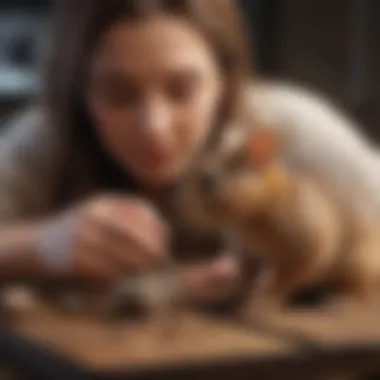

"Education doesn't stop after graduation; it's a continuous journey that impacts both the specialist and the animals they care for."
The Importance of Consultation
In the realm of exotic pet ownership, the role of a specialist goes beyond mere advice. The consultation process acts as a cornerstone for ensuring both pet well-being and owner satisfaction. It’s not just about answering questions; it’s about creating a partnership steeped in knowledge and trust. With an array of exotic animals ranging from reptiles to birds, the need for expert guidance cannot be overstated. These pets often come with unique care requirements and health challenges that differ significantly from traditional pets.
When owners consult with a specialist, they’re not just accessing information; they’re tapping into years of experience and specialized training. This expertise can alleviate common concerns that first-time exotic pet owners often face, such as dietary needs, habitat conditions, and behavioral expectations.
Navigating Pet Care Challenges
One of the most crucial aspects of consultation is the ability to navigate the myriad challenges of caring for exotic pets. Unlike dogs or cats, which have well-established care guidelines, exotic animals demand a tailored approach. Each species may require specific environmental conditions, diets, and social interactions. Here are some challenges that pet owners commonly encounter:
- Diet variations: Many exotic pets have very particular dietary needs that shift according to their life stages.
- Habitat customization: An iguana’s enclosure, for example, must be equipped with proper lighting, humidity, and interior design that mimics its natural habitat.
- Behavioral quirks: Understanding an exotic pet’s behavior is pivotal. What seems like aggression might actually be fear or stress.
Navigating these challenges is much easier with the guidance of a specialist. They can help pet owners design optimal living conditions and set realistic expectations for pet interaction, significantly reducing the likelihood of miscommunication and misunderstandings between species and owner.
Building Relationships with Clients
Establishing strong relationships with clients is another essential function of an exotic pet specialist. This aspect goes beyond simple transactions; it thrives on trust, empathy, and open communication. When specialists foster a sense of community with clients, they create an environment where pet owners feel comfortable returning for advice and assistance. Consider these points:
- Tailored Communication: Different owners have varied levels of knowledge about exotic pets. A good specialist knows how to tailor their approach to meet clients where they are, offering simple explanations or deep dives into complex topics as needed.
- Long-term Trust: Much like caring for a pet, nurturing a relationship takes time. Specialists who invest in their client relationships often see increased loyalty and, consequently, better pet outcomes.
- Community Building: When specialists engage with local communities through workshops or online forums, they establish themselves as trustworthy authorities, leading to an ongoing dialogue about pet care and enthusiastically spreading awareness.
Unique Health Concerns
In the world of exotic pets, addressing unique health concerns is not just an afterthought; it's a necessity. These creatures come from distinct ecological niches and, as such, their health needs can vastly differ from the more traditional cats and dogs. Specialists in exotic pet care must have a keen understanding of the specific health issues that these animals may face. Such awareness enables them to create tailored health plans and informs pet owners about potential red flags.
Moreover, an exotic pet specialist needs to navigate various factors like diet, habitat, and genetics, all of which play pivotal roles in the health of these animals. This expertise is critical not just for routine care but also for emergencies where understanding these unique aspects can be life-saving. For instance, the respiratory system of a bird differs significantly from mammals; what may be a harmless situation for a dog could spell trouble for a parrot. Therefore, consulting with an expert can make all the difference in preventing complications that could arise from misinformed care.
"In exotic pet care, knowledge is more than power; it's also protection."
Common Illnesses in Exotic Pets
Exotic pets, due to their specialized needs and environments, are prone to a range of health issues that may not be common in traditional pets. Understanding these illnesses can aid in early detection and treatment.
- Veterinary Care Gaps: Many veterinarians are trained primarily on common pets, leaving a gap in specialized knowledge regarding exotic species. Illnesses such as metabolic bone disease in reptiles or psittacosis in birds can be overlooked.
- Nutritional Deficiencies: Deficiencies can arise from an improper diet. For example, a lack of calcium can lead to serious health problems in reptiles and birds.
- Infectious Diseases: Diseases that spread easily within populations of exotic pets can pose significant risks. For instance, respiratory infections in birds are quite common and can escalate quickly if not treated promptly.
In essence, understanding these common illnesses helps exotic pet owners identify symptoms early, allowing timely intervention by healthcare professionals specializing in these types of animals.
Preventative Care and Treatments
Taking proactive measures in terms of health care for exotic pets can significantly enhance their quality of life. The adage "an ounce of prevention is worth a pound of cure" rings especially true in veterinary care for exotic species.
- Regular Check-ups: Routine visits to a specialized veterinarian can keep track of the pet's health, ensuring diseases are not lurking in the shadows.
- Customized Diet Plans: As previously mentioned, a tailored diet is essential. A bird may require a varied diet that includes a balance of fruits, vegetables, and specialized pellets. Getting it right can fend off a host of potential health problems.
- Environmental Enrichment: Keeping in mind the natural habitat of the exotic species can aid in better health. Creating an environment that mimics their natural habitat not only prevents stress but can also stave off behavioral problems.
- Vaccinations and Treatments: For some species, vaccinations can be crucial. Likewise, knowing how to administer specific treatments, such as administering fluids for dehydration in reptiles, is essential for an owner's toolkit.
In summary, adopting preventative care measures ensures that exotic pets can lead healthier lives, which is paramount for both the owner and the animal alike.
Behavioral Insights
Understanding the behavior of exotic pets is crucial for anyone engaging with these unique animals. Exotic animals, much like their more traditional counterparts, have their own set of instincts and social structures that can greatly influence how they interact with humans and their environment. The ability to observe, interpret, and manage these behaviors is essential for ensuring their welfare and promoting a harmonious living situation for both pets and owners. Specialists in exotic animal care are often called upon to provide strategies that can help mitigate behavioral issues while enhancing the human-animal bond.
Understanding Exotic Animal Behavior
Every exotic species has its characteristic behaviors, which can vary significantly among different types. For instance, a ball python may display a rather introverted and solitary nature, while a parrot is often more social and expressive. Understanding these behaviors involves recognizing the natural instincts and environmental needs that each animal has.
When a specialist assesses behavior, they often look at factors such as:
- Social Interaction: Many species thrive in social settings. For instance, budgerigars often prefer the company of other birds, which can influence their behavioral development.
- Territoriality: Some reptiles, like bearded dragons, may exhibit territorial behavior, which can lead to aggression if not managed properly.
- Environmental Enrichment Needs: Animals require stimulation for mental health, so providing appropriate toys, hiding spots, and climbing structures can be tremendously beneficial.
Recognizing the signs of stress or discomfort in an exotic pet is also a key element. Subtle cues such as scaling back on social interaction or changes in eating habits can indicate underlying issues. Such insights can help prevent long-term behavioral problems and support a brighter, healthier future for these creatures.
Training Techniques
There are various training techniques that specialists recommend, and it's important to tailor these methods to each species' specific needs. Here are a few techniques that have shown promise in practical applications:
- Positive Reinforcement: This method involves rewarding desired behaviors with treats, praise, or playtime, encouraging the animal to repeat those behaviors. This is widely used with parrots, for instance, as they respond well to rewards.
- Clicker Training: A more structured approach, clicker training uses a sound to mark the moment a desired behavior is performed, followed by a reward. This method can be particularly effective for animals like ferrets, who are intelligent and can learn commands quickly.
- Socialization Techniques: Gradually exposing exotic pets to various environments, sounds, and people can help them adapt and become well-rounded. For example, slowly introducing a rabbit to different settings can drastically reduce its stress levels when encountering new experiences later in life.
Ultimately, the goal of these training techniques is to improve the pet's quality of life while enhancing the relationship between the pet and its owner. In fact, a well-trained pet often leads to a more harmonious home, reducing the likelihood of behaviors that are disruptive or harmful.
"Behavioral insights are the bridge that connects understanding to action, offering both pet owners and specialists a roadmap to a better life together."
Ethical Considerations
The subject of ethical considerations in the realm of exotic pets is not just an afterthought; it’s a linchpin in determining responsible ownership and care practices. As people venture into owning these unique companions, various ethical dimensions come into play, impacting both the pets and their keepers. Understanding these complexities is paramount for any specialist working in this field.
Welfare and Conservation Issues
At the heart of exotic pet ownership lies the question of welfare. Keeping pets that are not traditionally domesticated poses distinct challenges. These animals often have needs that are vastly different from conventional pets. For instance, a parrot may require a social environment to thrive, while reptiles often need specific temperature gradients to remain healthy. Ignoring these needs can lead to significant distress or even premature death in pets not adapted to the domestic setting.
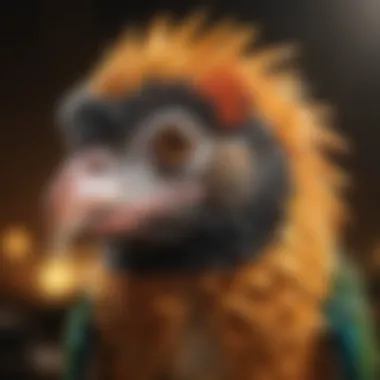
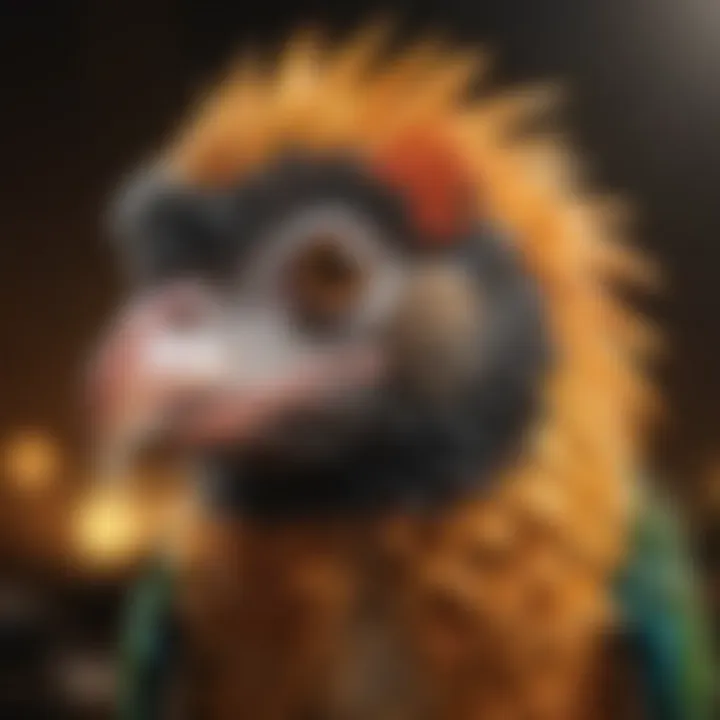
"Ethical pet ownership starts with understanding the unique behaviors and needs of the species you choose to keep."
Conservation issues intersect étroitement with pet ownership. Many exotic pets are wild animals that have been taken from their natural habitats. Conservationists argue that keeping such animals at home can contribute to the decline of populations in the wild. Awareness of these conservation challenges can guide prospective owners toward making informed choices. For example, opting for captive-bred reptiles rather than those captured in the wild can alleviate some of the stress on at-risk species.
Moreover, specialists play a vital role in educating clients on both welfare and conservation. They often advocate for practices that prioritize ethical sourcing of pets. Ensuring that a potential pet comes from a responsible breeder who participates in conservation efforts is crucial. This way, not only are pet owners nurturing their new companions responsibly, but they are contributing to broader conservation goals.
Legal Regulations Affecting Exotic Pets
The legal landscape surrounding exotic pets is complex and varies significantly from one region to another. Many places have established regulations to safeguard animal welfare and the environment. For instance, certain species may be completely banned or require special permits. This can include animals like Bengal cats or certain species of snakes that are considered potentially dangerous or prone to become invasive should they escape.
Understanding these laws is essential for both future exotic pet owners and specialists in the field. Specialists often serve as the guiding light, helping to navigate legal stipulations that can seem as convoluted as a labyrinth. They ensure that clients are aware of the responsibilities that come with ownership, including proper documentation and adherence to local regulations.
Additionally, there’s an ongoing dialogue about the appropriateness of certain species in captivity. Some laws are enacted in direct response to issues related to animal rights and welfare, aiming to prevent mishandling or neglect. Specialists need to stay current on these regulations, as they can influence the types of species available for potential owners and encourage practices that promote ethical ownership.
In summary, ethical considerations surrounding exotic pet ownership encompass welfare issues, conservation efforts, and the legal framework that governs them. For specialists, these topics are not merely academic; they are vital in shaping a more compassionate world for the exotic pets that we strive to understand and care for.
Challenges in Exotic Pet Care
Exotic pet ownership brings joy and companionship, but it also comes with its share of hurdles. Understanding these challenges is crucial for anyone dipping their toes into this unique world. This section examines the intricacies surrounding the care of exotic pets, particularly focusing on misinformation and practicality.
Addressing Misinformation and Myths
The landscape of exotic pet care is littered with misconceptions. Many individuals rely on myths rather than facts, which can lead to poor pet care practices. One common error is believing that all exotic pets are low-maintenance. Take, for example, the assumption that reptiles require little interaction—this can’t be further from the truth. While some species, like certain turtles, may thrive with minimal handling, others, like parrots, need social engagement for their mental health.
"The myth of low-maintenance exotic pets can lead to more harm than good."
Not only can misinformation affect daily care routines, but it can also have dire consequences for the health of these animals. Exotic pets like sugar gliders might benefit from a complex diet and environmental enrichment, yet many new owners think a basic diet will suffice. This disconnect often causes health issues that could have been avoided with proper guidance.
In combating these myths, education is key. Resources such as veterinary advice, reputable publications, and dedicated online communities can help dispel falsehoods. Sharing stories, firsthand experiences, and scientific knowledge is vital for fostering a well-informed community of exotic pet owners. Forums or platforms like Reddit can be valuable places for gaining insights from seasoned owners who have faced similar challenges.
Balancing Exotic Care with Practicality
When it comes to exotic pets, practicality is paramount. It's essential for owners to weigh their dedication and lifestyle against the needs of their chosen pet. For instance, some exotic species might require environments that mirror their natural habitats—this can be a financial and time-consuming endeavor. A macaw, for example, needs a spacious cage and a variety of toys for both physical and mental stimulation. The realities of everyday life must be considered.
- Budgeting: Exotic pets often incur unexpected costs—high-quality food, specialized vet visits, and habitat setup can quickly add up. This leads many to reconsider their plans if they haven't assessed their financial readiness.
- Time Commitment: Unlike traditional pets, many exotic species demand specific care routines that can occupy significant time slots in your day. An effective schedule must incorporate engagement, feeding, and cleaning to maintain a healthy habitat.
Finding a harmonious balance can make the difference between a thriving pet and a challenging ownership experience. It's not merely about providing care; it's also about ensuring that the care adheres to the practical realities of your life. This means not only understanding the needs of your exotic pet but also honestly evaluating what you can provide.
As you delve deeper into this niche area of pet ownership, consider these insights not just as challenges but also as opportunities for growth and learning. Owning an exotic pet can be a fulfilling journey when approached with the right mindset and knowledge.
The Future of Exotic Pet Specialization
The landscape of exotic pet care is continually evolving. With increasing awareness and interest in the unique needs of non-traditional pets, the future of exotic pet specialization holds many promising opportunities and challenges. Understanding this transformation is essential for current and aspiring specialists as they navigate a rapidly changing environment.
Emerging Trends in Pet Ownership
In recent years, pet ownership dynamics have shifted significantly. More people are opting for exotic animals as companions, diverging from the traditional cats and dogs. Social media plays a key role in this trend, showcasing the lives of unique pets, from flamboyant parrots to colorful reptiles. As families increasingly welcome these unconventional pets into their homes, the demand for knowledgeable care has surged.
This evolution comes with several notable trends:
- Increased Accessibility: Online platforms provide resources and communities for exotic pet enthusiasts, helping to spread awareness about best practices for care.
- Focus on Sustainability: Many individuals are becoming concerned about the conservation of endangered species. This is leading to a preference for adopting pets from ethical breeders who prioritize sustainability.
- Holistic Approaches: There's a growing inclination towards holistic pet care. Owners are now more interested in the mental and emotional well-being of their pets, prompting specialists to incorporate behavioral insights alongside medical care.
With these shifts, specialists must stay informed and adapt to evolving owner expectations. By doing so, they can better provide for the diverse needs of various species.
The Evolution of Specialist Roles
As exotic pet ownership blossoms, the role of exotic pet specialists is also transforming. Gone are the days when expertise centered strictly around veterinary skills. Today, specialists wear many hats, functioning not just as medical caregivers, but also as educators, counselors, and advocates for exotic pets.
Several factors are driving this evolution:
- Interdisciplinary Knowledge: Specialists are increasingly required to possess knowledge that spans animal behavior, veterinary science, and ecology. Such comprehensive training ensures they can address a variety of challenges that arise from the unique needs of exotic animals.
- Client-Centric Approaches: The focus is shifting towards building long-term relationships with pet owners. Educating clients on the nuances of exotic pet care builds confidence that translates to better pet management.
- Technology Integration: The rise of telehealth and virtual consultations allows specialists to reach a wider audience. They can provide guidance on husbandry practices or behavioral issues from miles away, making their expertise more accessible than before.
"The role of an exotic pet specialist is becoming increasingly multifaceted, requiring a blend of expertise that reflects the diverse needs of both the animals and their owners."
Culmination
In this article, we have traversed the intricate landscape of exotic pet care, summing up the indispensable role of an exotic pet specialist. Specialization in this field is paramount, considering the unique needs of various exotic species and their potential health concerns. The specialist acts not only as a caregiver but also as a cornerstone for pet owners, guiding them through the perplexing myriad of information available today.
Recapping the Role of Specialists
The core responsibilities of exotic pet specialists are both extensive and varied. They are equipped to handle everything from the initial consultation regarding exotic pet ownership to ongoing health assessments. This includes:
- Providing tailored advice on diet and habitat specifics, essential for the well-being of unconventional pets.
- Offering diagnostic services to address unique health concerns commonly associated with exotic species. These may include issues such as metabolic bone disease in reptiles or feather plucking in birds.
- Implementing training programs that cater specifically to the behavioral tendencies of each species, ensuring a harmonious household.
These specialists function as educators as well, often arming pet owners with knowledge about the social needs of their companions and the possible challenges they may face. They help dispel myths and clarify best practices, which is critical in nurturing healthy relationships between exotic pets and their owners.
The Ongoing Journey of Exotic Pet Care
The journey of caring for exotic pets is one fraught with ongoing learning and adaptation. As the ownership of such animals becomes more popular, the need for specialized care continues to evolve. Potential trending topics include:
- Innovation in veterinary practices, leading to better diagnostic tools for exotic species that were previously underserved in veterinary medicine.
- Enhanced community engagement, allowing owners to exchange knowledge and experiences, thus enriching the learning environment for both specialists and pet enthusiasts alike.
It's also crucial to note that staying abreast of legal regulations and ethical considerations is an ongoing endeavor. Owners and specialists alike must remain vigilant, ensuring that they are compliant with both the legal requirements and best practices in animal welfare.
Navigating the complexities of exotic pet care requires a partnership built on trust and knowledge. The ability to approach each case with nuance while incorporating new findings into practice is what truly encapsulates the evolving nature of this field. As exotic species continue to find their way into private homes, the role of the exotic pet specialist remains vital, paving the road for new discoveries and possibly even breakthroughs in pet care.















